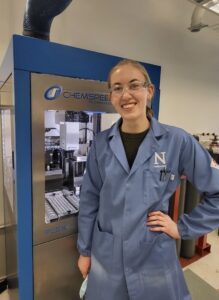Nanotechnology at Northwestern
Meet Madeleine Gaidimas, a graduate student in the Farha Research Group
February 02, 2022
Madeleine Gaidimas is a graduate student in the Farha Research Group, which seeks to solve problems in chemistry and materials science ranging from energy and environment related applications to challenges in national defense by employing atomically precise functional materials such as metal–organic frameworks (MOFs) and porous organic polymers (POPs).
 Where are you originally from?
Where are you originally from?
I lived in a few different spots on the East Coast, but mostly grew up in New Jersey.
Where did you complete your undergraduate degree?
I studied at Vassar College in Poughkeepsie, NY. I had a wonderful experience there and really enjoyed the opportunity to take classes across many different disciplines. In addition to my chemistry courses, I was able to take classes focused on art history, galactic structure, and even medieval science.
When did you first become interested in chemistry?
I’ve always been generally interested in science, but it wasn’t until college that I decided to pursue a career in chemistry. After enjoying my organic chemistry courses, I began doing research with Professor Chris Smart. In the Smart lab, I studied the synthesis of fullerenes, a class of carbon nanomaterials. I loved the creativity and problem-solving involved in the scientific research process, and my experiences doing undergraduate research motivated me to go to graduate school. I remained interested in nanomaterials and interdisciplinary research, and once at Northwestern, I joined Professor Omar Farha’s lab.
How do you explain what you study to non-scientists?
The Farha Group studies metal–organic frameworks, or MOFs, which are nanomaterials comprised of metal clusters and carbon-based molecules. These building blocks assemble to form multi-dimensional materials with precisely defined structures and large internal surface areas.
What are the challenges you’re trying to solve with metal-organic frameworks? What kind of potential do you see for them?
My work is focused on using MOFs to separate rare earth elements, a task that is currently performed using inefficient and energy-intensive methods. Rare earths have many unique properties and are essential components in the catalysts, magnets, and batteries that make up many low-carbon technologies such as fuel cells and wind turbines. The development of more efficient rare earth separation methods is crucial to enable clean technologies.
What has been a highlight of your time at Northwestern?
I have really enjoyed working in such a collaborative environment in the Farha lab. Our graduate students, postdocs, and visiting scholars all come from different research backgrounds, and everyone brings a unique perspective to the group. There are a variety of projects going on in our lab and it’s always interesting to see how people approach their research problems from different directions.
What has been the most challenging aspect of your work or your time at Northwestern?
I began my PhD in the fall of 2020, and it was a challenge to adapt to graduate school during a pandemic. After navigating most of my classes and teaching assignments online, I’m grateful to be back working safely in-person in the lab.
Can you tell me about your experiences either being mentored or mentoring others?
When I first joined the Farha Group, I was lucky to be trained by another graduate student, Florencia Son, who was an excellent mentor. I had no experience working with MOFs before graduate school, and my labmates have been incredibly helpful in sharing their expertise. Beyond guidance in the lab, senior graduate students have also provided guidance on delivering scientific presentations and preparing fellowship applications. Our lab has an extremely friendly and collaborative atmosphere, and we are constantly helping each other with different techniques and research ideas.
What are your hobbies outside of the lab?
For the past couple of years, I’ve been learning how to play the guitar. I also love food and cooking, so I usually have a few chemistry-adjacent culinary projects going on, including making my own yogurt and kombucha each week.